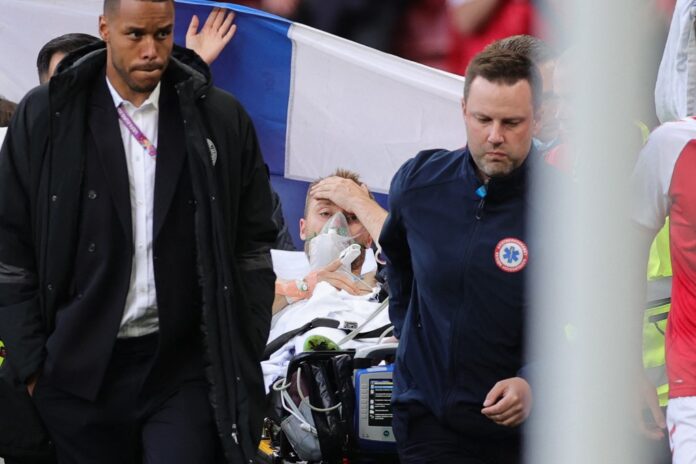On June 12, 2021, millions of football fans around the world collectively held their breath.
The match between Denmark and Finland being played on the second day of the delayed Euro 2020 tournament came to a halt in the final minutes of the first half when 29-year-old Christian Eriksen suddenly collapsed with no other player nearby.
Eriksen’s devastated Danish teammates formed a circle around their talisman while medical staff used a defibrillator to restart his heart and, ultimately, save his life.
The match resumed after Eriksen was taken to hospital, but Denmark’s 1-0 loss in front of their own fans was the last thing on anyone’s mind.
Fortunately, the Eriksen incident had a happy ending, with the star making a full recovery, but it is not always like that.
Footballers suffering heart problems, collapsing, or even dying suddenly, is causing increasing concern and confusion among both players and fans.
Many major stadiums around the world, let alone sports grounds where millions take part in amateur games, are not even equipped with defibrillators.
In December alone, four footballers and one coach died as a result of cardiac issues or football-related injuries. Sofiane Lokar, a 30-year-old Algerian defender with second division Mouloudia Saida, was the most recent death.
Adham El-Selhadar, the former Ismaili star and coach of Egyptian second-tier club Al-Majd Al-Sakandari, died from a heart attack after celebrating a goal. Indonesian third division player Tawfiq Ramzi, 20, died from injuries sustained in a collision with an opposing player, while Makhlid Al-Raqqadi, 29, of Omani club Muscat FC, suffered a fatal heart attack while warming up.
Croatian footballer Marin Cacic, 23, died three days after being placed in a coma after he collapsed during training with his club NK NeHajj Sinj.
In the wake of the player deaths, the world governing body FIFA has asked member countries to step up heart examinations of players to ensure their safety and ability to exercise normally.
It is also considering a proposal to expand medical examination programs to cover all international tournaments.
Studies into player deaths have intensified. A recent UK study at St. George’s, University of London, warned that the risk of football players dying from cardiac arrest are far greater than many doctors believe.
At least 108 players and coaches in England faced health problems between February and November, 2021, the study showed.
Fortunately, some cases are discovered in time, as was recently the case with Barcelona and former Manchester City striker Sergio Aguero, 33, who was forced into retirement after being diagnosed with an irregular heartbeat.
Prevention is key when it comes to protecting players’ health.
Experts in sports medicine and cardiovascular disease agree that deaths during games or training, and in sports in general, can be traced to the stress that athletes face, or to common causes of heart attacks, such as coronary artery disease.
Cardiac control in football and other sports differs from country to country. There is no UEFA or FIFA regulation that requires, for example, that all members follow a cardiac prevention model, as in the case of doping or brain trauma.
Many countries require players to have a sports medical certificate in order to compete, but they do not specify what tests have to be completed.
So what tests should be done? This is yet another issue without a worldwide consensus. While some experts say that it is important to have a complete examination that includes an electrocardiogram, exercise stress test and echocardiogram, others argue that a computer tomography and an MRI are sufficient.
One thing is clear: FIFA needs to quickly establish consistent rules regarding health examinations and not merely limit its response to ensuring that stadiums have defibrillators.
Protection of athletes’ health is the paramount concern.

